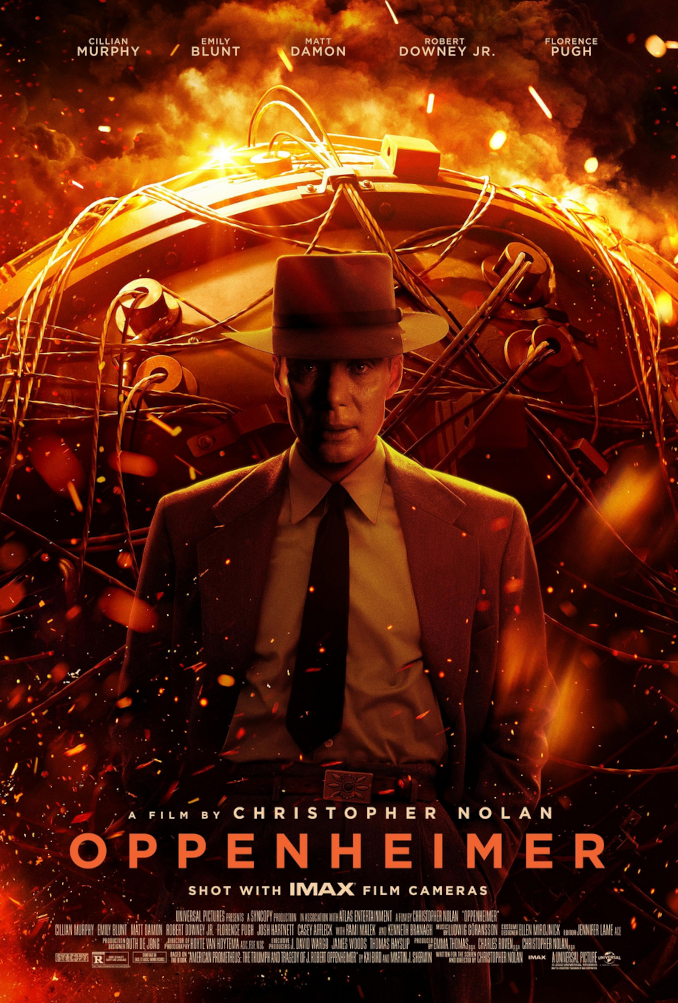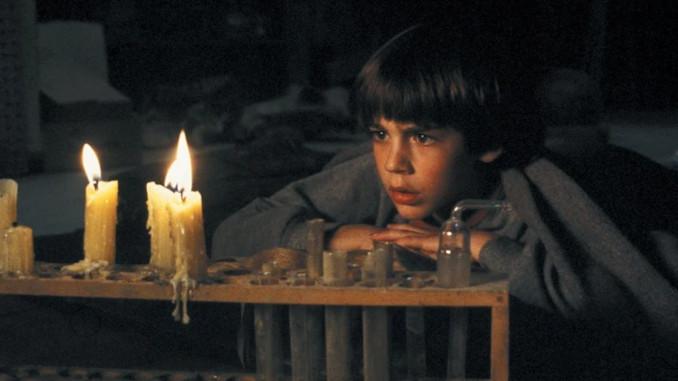
By Nina Heyn
Within one month of its global release, the movie Oppenheimer has grossed $700M in cumulative worldwide box office, making it more successful than Interstellar, the 2014 space movie by the same director, Christopher Nolan. The movie benefited from the social media trend of viewing both Oppenheimer and Barbie on the same day, and word of mouth made Oppenheimer a must-see of the season among young and older viewers alike. Marketing considerations aside though, the biographical tale of the creation of the first atom bomb has little to do with Barbie, but a lot to do with the director’s unique storytelling style, which places him in the category of the cinema auteurs of the last century, such as Stanley Kubrick, Federico Fellini, or artists of the French Nouvelle Vague. Nolan’s years of experimentation with narrative, timelines, and imagery—as expressed in the visuals of folding houses in Inception or the sequences of time reversal in Tenet—have now culminated in the way he tells the true and frightening story of the WWII arms race.









With both Barbie and Oppenheimer, I avoid them. Whenever movies get marketed this heavy in legacy media, I just lose interest.
Will maybe watch this one in the future to see what they tried to say.
We have a list in the Annual Wrap Ups of all the Lets Go to the Movies recommendations since 2008. Lots and lots of movies and documentaries that I would put ahead of these two. Here is the list from the last Annual Wrap Up https://whosyourfarmer.solari.com/lets-go-to-the-movies/
I am appalled that this movie should be recommended by Solari and called Food for the Soul.
This man (Oppenheimer) exhibited so many psychopathic tendencies during his life that it is impossible to believe that he succeeded in his task without the backing of those of that ilk: the Parasites and their minions who were (and are) running the war.
When I heard what this movie was about, I refused to give it any of my money. Why should I support the glorification of a man who made possible the horrific deaths of so many civilians? Hollywood is well known for glorifying those whose actions should be vilified. Far too many of this world’s accolades are given to those who further the Parasites’ agendas, such as Barack Obama who was given the Nobel Peace Prize in 2009 after doing nothing for peace.
Many people think that if this country hadn’t dropped those bombs, the Japanese would have. From this distance in time, the propaganda machinery that swung into action during World War II has made it very difficult to ascertain what was really going on. It is known, however, that the bombing of Pearl Harbor was allowed to happen, despite strong propaganda to the contrary, both then and since. Do we really know that the Japanese had a functional bomb and were going to use it if we didn’t bomb them first, or was that more propaganda?
Even if they had, one thing is certain: a country cannot consider itself to have won a war if it loses its soul in the process. If a country takes on the hated, immoral aspects of the enemy it is fighting, then the enemy has won.
And so, a brilliant director makes a movie about the man who made such horror possible, and Nina Heyn suggests that the brilliance of this director is a good reason to watch the movie. She even suggests that it was just a stunt that someone on TikTok suggested people watch Barbie and Oppenheimer together without looking at the deeper significance of that stunt.
I have no doubt Oppenheimer trotted out the familiar lies and propaganda about World War II so that another generation can be brainwashed by them. This new generation, however, has been trained to be emotionally vulnerable. Watching Barbie, with its lighter emotional tone, and Oppenheimer together would go a long way toward blunting the latter’s impact on the audience’s emotions.
In addition, I suggest that the loud music that obscured the dialogue during the scene where the consequences of splitting the atom were discussed by the characters in Oppenheimer was not just an artistic effect, but was designed to inhibit understanding and post-movie discussion of those issues. After all, they wouldn’t want to do anything that would diminish the already tiny support for the war in the Ukraine.
Some of us are old enough to remember – and lived in a place that discussed – the controversy surrounding the death of Lord Rutherford, the New Zealander whose work at Oxford made possible the splitting of the atom. Several of his speeches and writing from late in his life gave rise to the possibility that he took his own life when he realized the purpose to which his work was being put. There were also rumours that Rutherford was not alone among other scientists in his horror, and that this was why Robert Oppenheimer – who was not considered a hero, or particularly brilliant, at the time – was the one available to finish the research ‘needed’ to make the bomb. It is hard to reconcile the movie’s purported portrayal of his after-the-fact soul-searching with the psychopathic tendencies he exhibited throughout his life.
On a personal note, I have been following Catherine’s work for perhaps ten years. While I have not found it necessary to see all the movies recommended on Solari, this is the first time I have found it necessary to point out the dangers of seeing a movie because of its artistic merits without a discussion of the subversion of art to the furthering of the parasite class’s agendas. Not well done.
Check out Hiroshima Revisited, Dr. Robert Palmer.
It could all be a huge double cross.
https://archive.org/details/Hiroshima_revisited
Fascinating! Thanks for this. I hadn’t heard it before, but it makes sense. I have always wondered how Hiroshima and Nagasaki became habitable again so soon after the war, especially since Chernobyl is still off-limits.
Or it could all be an op…http://mileswmathis.com/oppen.pdf Hard to know what’s true or false or semi-true/false these days…
op=scam=double cross
Op-penheimer
LOL
I understood it to be a review rather than a recommendation.
And from the review, I thought it evident that Oppenheimer was in no way being glorified.
Nolan is a serious auteur director, and you can be sure he was speaking as much about today as yesterday, and commenting critically on many levels about human nature, governments, the unseen influences that drive history (whether earthly or otherwise), and this towering precedent in the evolution of the military-industrial complex.
If I may gently note, the points Nolan was making artistically might overlap with many of your and our beliefs. I don’t say this to criticize, but simply to defend Ms. Heyn’s treatment of it appearing here.
A documentary we can judge against history. This movie is a critical moment in history painted with light and projected through the prism of one man’s art.
Thank you, James.
I have not seen the movie and do not intend to see it – although may see it when it is available to stream to sew what DOD’s intended message was. That said, Nina is free to write about what she chooses. I assume from reading her review that she chose it because of the box office success, because the director did a good job at his craft and because the movies this year are slim pickens. But I will ask her to speak for herself.
If news, documentaries and non-fiction degenerate into censorship and propaganda, truth can retreat into historical fiction.
If censorship and propaganda knock on the doors of those who create truth-telling fiction, truth can retreat to multi-layered storytelling that still qualifies for global investment and distribution, while carrying decodable truths.
The artistic creations of Christopher and Jonathan Nolan have made immeasureable contributions to transparency of attacker threat models and potential defenses by civil society. These contributions have sometimes (e.g. <EM>Perons of Interest</EM> and S3/S4 of <EM>WestWorld</EM>) appeared early enough to motivate actionable solutions.
(reposting since EDIT function is broken, incorrectly says “You are posting too fast” within the 5 minute edit window, then disallows edits altogether after 5 minutes. The DELETE function has also been removed. corrected version follows)
If news, documentaries and non-fiction degenerate into censorship and propaganda, truth can retreat into historical fiction.
If censorship and propaganda knock on the doors of those who create truth-telling fiction, truth can retreat to multi-layered storytelling that still qualifies for global investment and distribution, while carrying decodable truths.
The artistic creations of Christopher and Jonathan Nolan have made immeasureable contributions to transparency of attacker threat models and potential defenses by civil society. These contributions have sometimes (e.g. “Person of Interest” and S3/S4 of “WestWorld”) appeared early enough to motivate actionable solutions.
Nolan’s “Inception” had an interesting phrase on mind control – the CEO character had undergone “militarized subconscious” defense training against psychic attacks.
Dear Diana:
As Catherine says- all the reviews of movies are solely my take on cinema and do not represent anything or anybody else, so your comments do not apply to Solari as a whole. Catherine has not read the review beforehand and it does not represent anybody’s views but mine. I occasionally comment on events, exhibitions or movie releases as they are milestones in the cultural landscape. For example, I reported on the fire at Notre Dame in Paris, even if it was hardly a positive event or immediately relevant to people living in the US but it was important for me to talk about it as a loss to humanistic culture. Similarly, I talk about this movie because it an important sociological event and a major, successful release by a prominent director. I report on art and movies but it is anybody’s choice if they want to see what I report about.
My take away from this movie was that Nolan was filming a cautionary tale about the dangers and a horror of nuclear threat rather than that he was supporting the events that took in 1945.
I have no idea if Oppenheimer the person was a psychopath but, as the majority of the audience, especially the young people, have only a movie to look at and nothing in it suggested to me that he was one, at least not the character portrayed. I really cannot comment on this assumption.
I also think that the view that the music was designed to obscure the dialogue to prevent discussion about the movie is your opinion to which you are absolutely entitled. I choose to believe that the director made the movie precisely to show the character’s doubts and fears and that he is using the soundtrack to show it. Again, we may have a difference of opinion but I’m not sure how the director’s artistic choices on this movie connect to the war in Ukraine.
To me the movie is about the issue about potential dangers of any nuclear activity, even industrial. These dangers are present now as much as they were then. For example, Japan is releasing some contaminated waters into the ocean. There is also a threat of the use of nuclear weapons in the current conflicts in Europe and other continents. I don’t think the director was shying from these implications.
I do not take the subject likely. As I am writing to you today, I’m sitting less than 300 miles from the war zone, very much aware of how it affects my life every day. The threat of totalitarian destruction of anything that is good and human has been present in my life since the day I was born.
I appreciate your comments and the fact that your different point of view is stirring a debate – to me it is better than ignoring issues. For me that is what works of art are for- to allow people express different points of view. I’m sorry if you felt unhappy by this review or the implications of it. You are right -this movie is hardly soothing but my section is called what is called so I had to place it somewhere. Again, please do not blame Solari or Catherine- the Solari team lets me roam the cultural landscape with benign tolerance for which I thank them.
Would Nina be willing to interview Jay Dyer about her recent movie picks and reviews – may be enlightening for all involved.